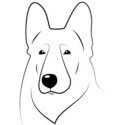Bone Cancer in Dogs
Bone cancer in dogs is one of the most common types of canine cancer.
It is found most often in giant dog breeds, such as Great Danes, Irish Wolfhounds and Saint Bernards, though it can be found in any large breed. Dogs weighing over 80 pounds, such as Boxers, Golden Retrievers, Labradors, Rottweilers or German Shepherds, have a greater chance for developing canine bone cancer.
Osteosarcoma (OSA) is normally the culprit. It is found in over 80% of all cases of cancer in dogs.
What is It?
Canine osteosarcoma is an aggressive tumor that develops deep within the bone and progresses painfully to the surface of the bone. It literally destroys the bone from the inside out.
Other types of canine bone cancer are:
- Chondrosarcoma (CSA) is the second most common type of bone cancer in dogs. This cartilage tumor is present in about 5-10% of cases. It normally occurs on flat bones (skull or ribs) and is not as malignant as OSA.
- Fibrosarcoma (FSA) is a much rarer form of bone cancer. Less than 5% of bone tumors are in this category which affects the jaw, facial bones, ribs and spinal column.
- Hemangiosarcoma (HSA) also accounts for less than 5% of cases but has a higher rate of metastasizing. It normally occurs in younger dogs and can affect the limbs, or the skull, spinal column and rib cage.
- Multilobular Osteochondrosarcoma is a rare tumor that develops off the linng of the bone (or peristeum). It normally involves the skull, and can also affect the pelvis, ribs and hard palate (or roof of the mouth).
- Synovial Sarcoma. This is a malignant tumor that develops in the lining of the joints. It is rare, but also very aggressive.
What Causes It?
Not much is known about the cause of osteosarcoma in dogs, though it is thought to have some hereditary factors. It can develop in any bone, but the vast majority of cases occur in the long bones or limbs. The front legs are affected more frequently than the rear legs.
Symptoms of Bone Cancer in Dogs
Signs of bone cancer may be difficult to spot as it can initially be mistaken for sprains or a pinched nerve. In younger dogs, it can also be mistaken for "Pano" or Panosteitus, more commonly known as "growing pains". A painful tumor may cause your dog to avoid the use one of its legs. The pain will start intermittently and become more constant.
Bone cancer is extremely painful. Your dog may act with irritation, or even aggressiveness, if you touch her affected leg.
You may observe signs such as:
- crying
- inactivity
- sleeplessness
- swelling of the limb
- whimpering
How is it Diagnosed
Persistent lameness should be evaluated with x-rays. Unfortunately, many times weeks or months have passed by the time a diagnosis is sought. I'm all for letting sprains heal on their own, but I keep a real close eye on my dog if the signs persist for more than a few days.
Treatment
Surgery is normally recommended to remove the affected area. But, Osteosarcoma is a very fast spreading tumor and can spread, or metastasize, to the lung.
Consider switching to a grain free dog food as cancer cells love carbohydrates (especially sugar).
If you're in a situation where your dog has been diagnosed with bone cancer, try to stay positive and surround yourself with support. I would recommend joining an online support group that can help you through this trying time.
I would also recommend contacting a holistic vet who can assist in creating a multi-prong approach and treatment plan. If the body conditions that allowed the cancer to develop in the first place are not corrected, it will likely recur.
Prevention
It bears repeating. The best defense against bone cancer in dogs, or any illness for that matter, is to provide quality dog food. If your dog's body is forced to work with subpar ingredients, abnormal cell growth can be much more likely.






